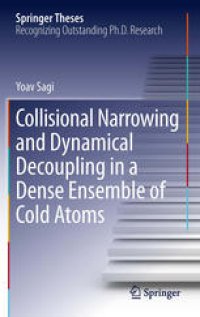
Ebook: Collisional Narrowing and Dynamical Decoupling in a Dense Ensemble of Cold Atoms
Author: Yoav Sagi (auth.)
- Tags: Atomic Molecular Optical and Plasma Physics, Quantum Information Technology Spintronics, Quantum Physics, Low Temperature Physics
- Series: Springer Theses
- Year: 2012
- Publisher: Springer-Verlag Berlin Heidelberg
- Edition: 1
- Language: English
- pdf
Ultra-cold atomic ensembles have emerged in recent years as a powerful tool in many-body physics research, quantum information science and metrology. This thesis presents an experimental and theoretical study of the coherent properties of trapped atomic ensembles at high densities, which are essential to many of the aforementioned applications. The study focuses on how inter-particle interactions modify the ensemble coherence dynamics, and whether it is possible to extend the coherence time by means of external control. The thesis presents a theoretical model which explains the effect of elastic collision of the coherence dynamics and then reports on experiments which test this model successfully in the lab. Furthermore, the work includes the first implementation of dynamical decoupling with ultra-cold atomic ensembles. It is demonstrated experimentally that by using dynamical decoupling the coherence time can be extended 20-fold. This has a great potential to increase the usefulness of these ensembles for quantum computation.
Ultra-cold atomic ensembles have emerged in recent years as a powerful tool in many-body physics research, quantum information science and metrology. This thesis presents an experimental and theoretical study of the coherent properties of trapped atomic ensembles at high densities, which are essential to many of the aforementioned applications. The study focuses on how inter-particle interactions modify the ensemble coherence dynamics, and whether it is possible to extend the coherence time by means of external control. The thesis presents a theoretical model which explains the effect of elastic collision of the coherence dynamics and then reports on experiments which test this model successfully in the lab. Furthermore, the work includes the first implementation of dynamical decoupling with ultra-cold atomic ensembles. It is demonstrated experimentally that by using dynamical decoupling the coherence time can be extended 20-fold. This has a great potential to increase the usefulness of these ensembles for quantum computation.
Ultra-cold atomic ensembles have emerged in recent years as a powerful tool in many-body physics research, quantum information science and metrology. This thesis presents an experimental and theoretical study of the coherent properties of trapped atomic ensembles at high densities, which are essential to many of the aforementioned applications. The study focuses on how inter-particle interactions modify the ensemble coherence dynamics, and whether it is possible to extend the coherence time by means of external control. The thesis presents a theoretical model which explains the effect of elastic collision of the coherence dynamics and then reports on experiments which test this model successfully in the lab. Furthermore, the work includes the first implementation of dynamical decoupling with ultra-cold atomic ensembles. It is demonstrated experimentally that by using dynamical decoupling the coherence time can be extended 20-fold. This has a great potential to increase the usefulness of these ensembles for quantum computation.
Content:
Front Matter....Pages i-xiii
Introduction....Pages 1-4
The Experimental Setup....Pages 5-31
Theoretical Framework....Pages 33-37
Spectral Narrowing due to Elastic Collisions....Pages 39-44
The Ensemble Spectrum with an Arbitrary Detuning Distribution....Pages 45-51
Motional Broadening in Ensembles with Heavy-Tail Detuning Distribution....Pages 53-60
Suppression of Collisional Decoherence by Dynamical Decoupling....Pages 61-67
Summary and Outlook....Pages 69-72
Back Matter....Pages 73-81
Ultra-cold atomic ensembles have emerged in recent years as a powerful tool in many-body physics research, quantum information science and metrology. This thesis presents an experimental and theoretical study of the coherent properties of trapped atomic ensembles at high densities, which are essential to many of the aforementioned applications. The study focuses on how inter-particle interactions modify the ensemble coherence dynamics, and whether it is possible to extend the coherence time by means of external control. The thesis presents a theoretical model which explains the effect of elastic collision of the coherence dynamics and then reports on experiments which test this model successfully in the lab. Furthermore, the work includes the first implementation of dynamical decoupling with ultra-cold atomic ensembles. It is demonstrated experimentally that by using dynamical decoupling the coherence time can be extended 20-fold. This has a great potential to increase the usefulness of these ensembles for quantum computation.
Content:
Front Matter....Pages i-xiii
Introduction....Pages 1-4
The Experimental Setup....Pages 5-31
Theoretical Framework....Pages 33-37
Spectral Narrowing due to Elastic Collisions....Pages 39-44
The Ensemble Spectrum with an Arbitrary Detuning Distribution....Pages 45-51
Motional Broadening in Ensembles with Heavy-Tail Detuning Distribution....Pages 53-60
Suppression of Collisional Decoherence by Dynamical Decoupling....Pages 61-67
Summary and Outlook....Pages 69-72
Back Matter....Pages 73-81
....